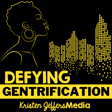
Past and Present Black Migrations for Liberation with Arionne Nettles
I knew this week sitting down with Chicago-based journalist Arionne Nettles was going to be a great conversation, but I was very excited about what she had to share, about how Black migration and neighborhood choices past and present are in defiance of gentrification.
And our hot topic this week is the terrible parking meter deal that the mayor of Chicago made in 2008, that’s actually not how you want to pay for parking.
About Our Guest
Arionne Nettles is a university lecturer, culture reporter, and audio aficionado. Her stories often look into Chicago history, culture, gun violence, policing, and race & class disparities, and her work has appeared in the New York Times Opinion, Chicago Reader, The Trace, Chicago PBS station WTTW, and NPR affiliate WBEZ.
She is a lecturer and the director of audio journalism programming at Northwestern University’s Medill School as well as host of the HBCU history podcast Bragging Rights and Is That True? A Kids Podcast About Facts. Her book, We Are the Culture: Black Chicago’s Influence on Everything, will be published by Chicago Review Press in 2024.
Hot Topic Reference article
https://news.wttw.com/2023/07/27/wttw-news-explains-what-happened-chicago-s-parking-meter-deal
Purchase Arionne’s book from my Bookshop — https://bookshop.org/p/books/we-are-the-culture-black-chicago-s-influence-on-everything-arionne-nettles/20193723?ean=9781641608305
Never miss an episode, subscribe to our Substack or on LinkedIn
You can also find Kristen @blackurbanist or @kristpattern.

